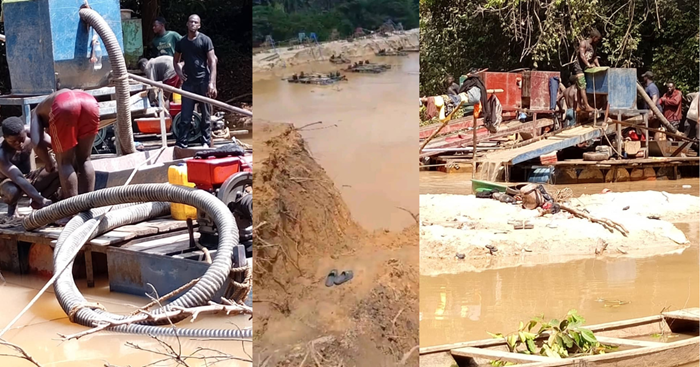Residents in the Northern District of Tonkolili have expressed dissatisfaction over the way illegal mining have affected their lives. In an interview with this reporter on the 13th July 2024, residents living around the River Rokel said they are forced to drink dirty and unpurified water from the river.
“It’s really sad that our Communities have been occupied by Foreign Miners with no regards for our laws. They’re doing with impunity and some of our stakeholders are helping them,” a Chief in Kamatha village in Simiria Chiefdom said.
The pleaded for anonymity for security reasons. The village is currently hosting Ghanaian nationals and their activities have affected the villagers.
The Rokel River, flowing through the Tonkolili District in Sierra Leone, is a vital waterway for the local communities, providing water for drinking, agriculture, and other domestic purposes. However, recent activities have raised concerns about its misuse, particularly related to illegal gold mining.
These activities are reportedly carry out by certain Ghanaian nationals and facilitated by some selfish stakeholders who prioritize their interests over environmental and community well-being.
Illegal gold mining, often referred to as “galamsey” in Ghana, has found its way into Sierra Leone of recent.
Unfortunately, the authorities are doing nothing to stop this. This mining is characterized by its unregulated and often environmentally destructive practices. The involvement of some Ghanaian nationals in these activities has brought with it techniques and methods that exacerbate the impact on the Rokel River.
Environmental Degradation is the most immediate consequence of illegal gold mining in the District. The process typically involves the use of mercury and cyanide to extract gold from ore, which then seeps into the river, contaminating the water and posing severe health risks to the local population.
The deforestation and soil erosion that accompany mining operations further exacerbate the problem by increasing sediment loads in the river, reducing water quality and disrupting aquatic ecosystems.
Water Pollution, the use of toxic chemicals in gold mining leads to significant water pollution. Mercury and cyanide are particularly harmful as they can persist in the environment and accumulate in the food chain. This pollution not only affects human health but also harms wildlife and disrupts local biodiversity.
The Rokel River is a crucial resource for the residents of Tonkolili District, who rely on it for drinking water, and other domestic needs.
Contaminated water from the Rokel River is unsafe for consumption. Exposure to heavy metals like mercury can cause severe health issues, including neurological damage and developmental defects in children. The lack of access to clean water forces communities to use polluted river water, increasing the incidence of waterborne diseases and other health complications.
Some Stakeholders support for continuation of illegal gold mining in the Rokel River area is often attributed to selfish and self-centered stakeholders who benefit from these activities.
These individuals driven by financial gain, may facilitate or turn a blind eye to the environmental and social impacts of this illegal mining.
The misuse of the Rokel River by illegal elicit gold mining activities represents a significant challenge for Tonkolili District and addressing this issue requires a multifaceted approach involving all stakeholders .




 Post a comment
Post a comment









